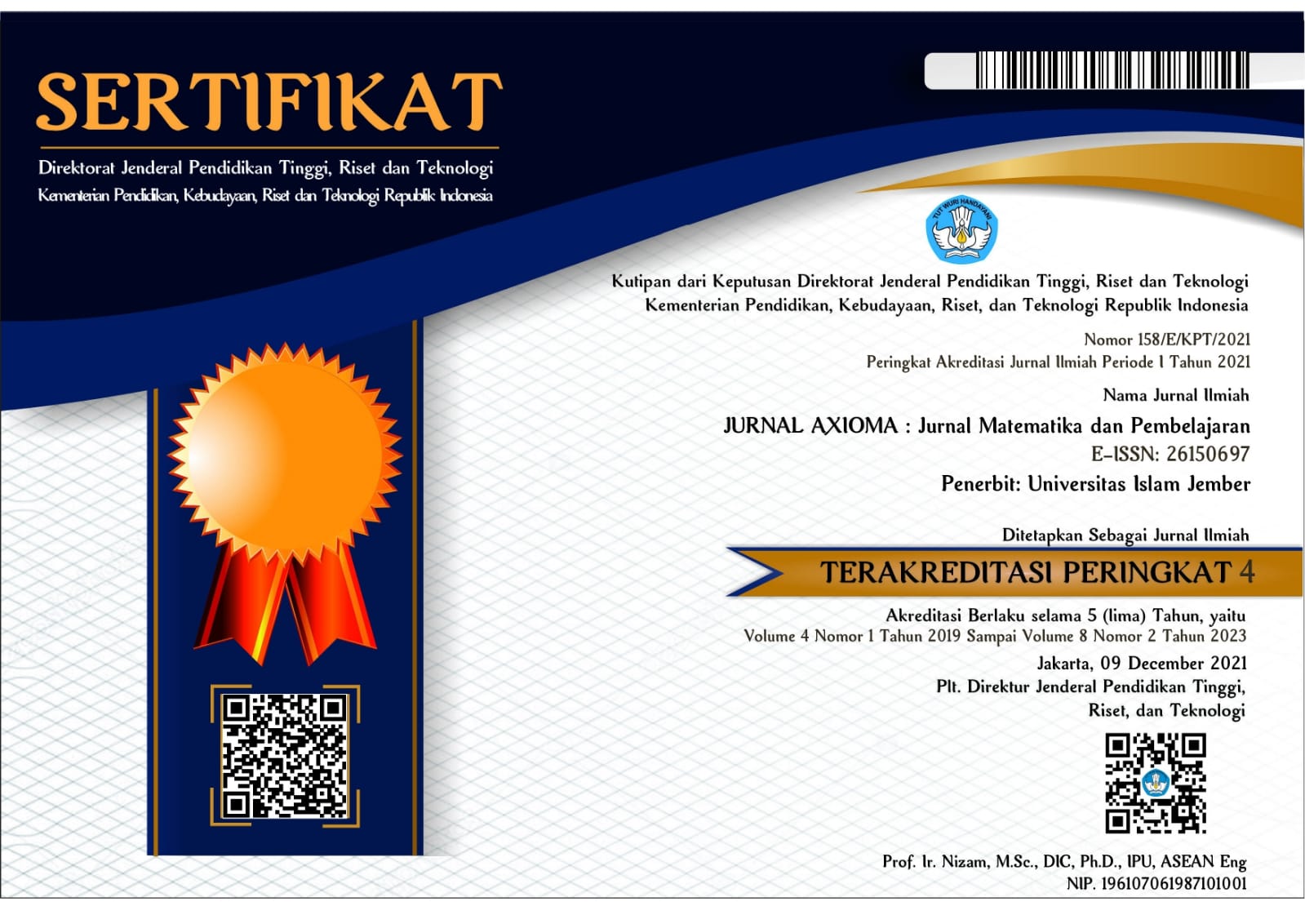The Difficulties Resolve of Students in Learning by Using Problem Possing with Mind Mapping Technique
Abstract
Mathematical learning should be construct to develop problem solving ability for students. One of strategy that can use in learning mathematic is Problem Possing Strategy. There are two activities students in problem possing strategy ie create the problems and looking for the solution. But, students often get dificulty when do it. Mind mapping tehnique can help student to create the problems and the solutions.
Key words: problem possing, mind mapping, problem
References
Brinkmann, A. 2008. Investigating the Use of Concept Mapping as Tools in Mathematics Education. Germany: University of Münster.
Brown, S. I. & Walter, M. I. 2005. The Art of Problem Posing. New Jersey: London.
Buzan, T.2013. Buku Pintar Mind Map. Jakarta : Gramedia.
Cai, J., & Hwang, S. (2002). Generalized and Generative Thinking in U.S. and Chinese Students' Mathematical Problem Solving and Problem Posing. Journal of Mathematical Behavior, 21(4): (hlm. 401–421).
Cankoy, O. & Darbaz, S.2010. Effect Of A Problem Posing Based Problem Solving Instruction on Understanding Problem. Hacettepe Üniversitesi E?itim Fakültesi Dergisi (H. U. Journal of Education),38:(hlm. 11-24).
Chiou, C.2008. The Effect of Concept Mapping on Students’ Learning Achievements and Interests. Innovations in Education and Teaching International,Vol. 45, No. 4:(hlm 375–387).
Demir, B. 2005. The Effect of Instruction with Problem Posingon Tenth Grade Students’ Probability Achievement and Attitudes Toward Probability. Tesis: School Of Natural And Applied Sciences Of Middle East Technical University.
Desyanti, F. & Susanah.2010.Penerapan Metode Pembelajaran Mind Mappingpada Materi Statistika.JurnalMATHEdunesa,Vol. 2 No. 1 (2013) : (hlm. 1-7)
English,L.1998.Children’s Problem Posing within Formal and Informal Contexts. Journal for Research in Mathematics Education, 29 (1):(hlm.83-107).
Ghasempour, Z.; Bakar, Md.; Jahanshahloo, G.2013. Innovation in Teaching and Learning through Problem Posing Tasks and Metacognitives. International Journal of Pedagogical Innovations,Vol. 1, No. 1: (hlm.57-66).
Herawati, O.; Siroj, R.; Basir, D.2010. Pengaruh Pembelajaran Problem Posingterhadap Kemampuan Pemahaman Konsep Matematika Siswa.Jurnal Pendidikan Matematika,Vol 4. No.1: (hlm.70-80) .
Kojima, K.; Miwa, K. & Matsui, T.2009.Study on Support of Learning from Examples in Problem Posing as a Production Task.Proceedings of the 17th International Conference on Computers in Education [CDROM].Hong Kong: Asia-Pacific Society for Computers in Education.
Mahmudi, A. 2010. Mengukur Kemampuan Berpikir Kreatif Matematis. Makalah Disajikan Pada Konferensi Nasional Matematika XV UNIMA Manado, 30 Juni-3 Juli 2010.
Rahayu, R.; Suyitno, A.& Sugiharti, E. 2012. Keefektifan Pembelajaran Kooperatif Model Mind Mapping Berbantuan Cd Pembelajaran terhadap Hasil Belajar. Unnes Journal of Mathematics Education 1 (1): (hlm.45-51).(http://journal.unnes.ac.id/sju/index.php/ujme).Diaksestanggal 6 Desember 2013.
Silver, E & Cay, J. 1996. An Analysis of Arithmetic Problem Posingby Middle School Students. Journal for Reaserch in Mathematic Education,Vol.27/No.5 ( hlm. 521-539).
Siswono, T. 2004. Mendorong Berpikir Kreatif Siswa Melalui Pengajuan Masalah (Problem Posing). Konferensi Nasional Matematika XII, Universitas Udayana , Denpasar, Bali. 23-27 July 2004.
Sutame, K. 2011. Implementasi Pendekatan Problem Posing untuk Meningkatkan Kemampuan Penyelesaian Masalah, Berpikir Kritis serta Mengeliminir Kecemasan Matematika.Makalahdipresentasikandalam Seminar NasionalMatematikadanPendidikanMatematika FMIPA UNY.Prociding, ISBN : 978 – 979 – 16353 – 6 – 3 .
Downloads
Published
How to Cite
Issue
Section
License
Copyright (c) 2016 Jurnal Axioma : Jurnal Matematika dan Pembelajaran

This work is licensed under a Creative Commons Attribution 4.0 International License.


2.jpg)
.jpg)











